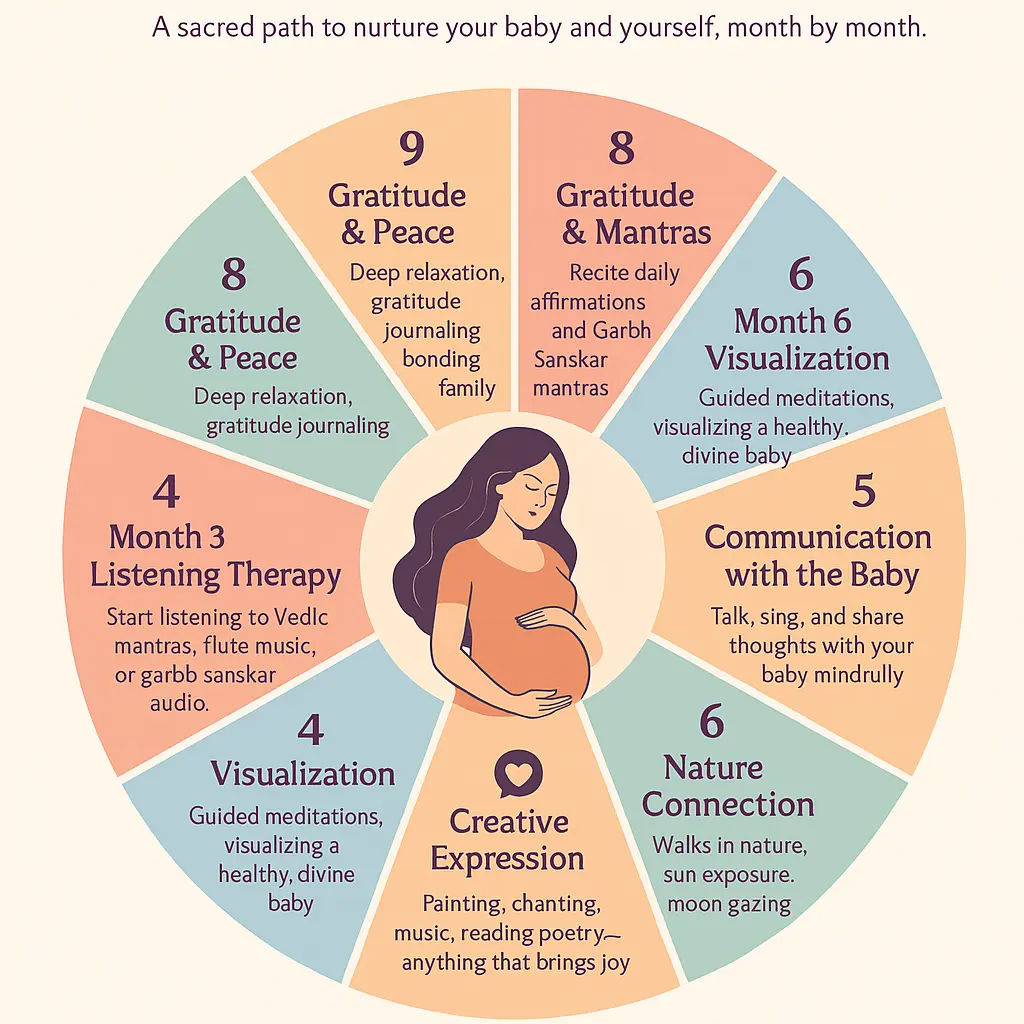In essence, embracing a Garbh Sanskar month-by-month plan is about consciously and lovingly nurturing the new life within you. This ancient Indian wisdom provides a beautiful framework for enhancing the physical, mental, and emotional environment for your developing baby, from the first moments of life. By integrating positive thoughts, a nourishing sattvic diet, calming music, mindful activities, and deep bonding practices throughout each trimester, you are not only supporting your baby’s well-being but also enriching your own pregnancy experience, making it more serene and joyful.
The journey we have outlined, from establishing foundational peace in the first trimester to nurturing growth and connection in the second, and finally preparing for a calm arrival in the third, serves as your guide to this holistic practice.
However, the most crucial takeaway is that this traditional wisdom thrives best when it walks hand-in-hand with modern medical science. While these Garbh Sanskar practices provide immense benefits for your well-being, they are a powerful complement to, and never a replacement for, regular, evidence-based antenatal care from a qualified obstetrician. This partnership between ancient wisdom and modern safety is the cornerstone of a truly healthy pregnancy. At Borneo Hospital, our Ayurvedic and Obstetric teams work collaboratively to provide this integrated, supportive care, ensuring you and your baby receive the best of both worlds.
Introduction: The Sacred Journey of Pregnancy
In India, pregnancy is revered as a sacred and transformative journey. It’s a time when a mother does everything in her power to nurture the new life within her, focusing not just on physical health, but on creating a positive and serene environment for her unborn child. One of the most profound ways to achieve this is through the ancient practice of Garbh Sanskar.
At Borneo Hospital, we believe in a holistic approach to maternity care, one that respects our rich cultural traditions while being firmly grounded in modern medical excellence. Our team of Ayurvedic experts, including Dr. Vaidehi Deodhar at our Nashik branch and Dr. Rashmi Chaturvedi in Raipur, work alongside our gynaecologists to support this vision.
This article aims to be your comprehensive guide to creating a Garbh Sanskar month-by-month plan. We will demystify its principles and offer a practical, stage-by-stage guide on how to integrate these beautiful practices with your essential modern antenatal care for a truly holistic, healthy, and happy pregnancy.
The Foundation: What is Garbh Sanskar?
Garbh Sanskar is a Sanskrit term meaning “education in the womb.” It is an ancient Ayurvedic and Vedic practice based on the profound philosophy that a child’s mental, emotional, and spiritual development begins from the moment of conception. The core belief is that the unborn baby (shishu) is a conscious being, receptive to the mother’s thoughts, emotions, diet, lifestyle, and the surrounding environment.
Garbh Sanskar aims to create the most positive, nurturing, and divine intrauterine atmosphere to help shape a healthy, intelligent, serene, and virtuous child, while also supporting the mother’s well-being.
The Crucial Partnership: Garbh Sanskar and Modern Antenatal Care
Before we begin our month-by-month journey, it is vital to state this clearly:
Garbh Sanskar is a powerful complementary practice that supports your well-being. It does NOT replace the need for regular, evidence-based antenatal check-ups with your obstetrician.
Modern medical care, with its scans, blood tests, and monitoring, is your safety net. It ensures the physical health and safety of you and your baby by detecting and managing potential complications.
At Borneo Hospital, we see the ideal approach as a partnership: using the wisdom of Garbh Sanskar to enhance your mental and emotional wellness while relying on your obstetrician for your essential medical care. Always discuss any practices, herbs, or dietary changes with your doctor.

Your Garbh Sanskar Month by Month Plan
Here is a general guide to incorporating Garbh Sanskar practices as your pregnancy progresses.
1. First Trimester: Laying the Foundations of Peace (Months 1-3)
This is a time of incredible foundational development for your baby. Your focus should be on creating a calm, positive internal environment.
- Month 1: As new life begins, focus on positive affirmations and a sense of joy. Begin a sattvic diet – simple, pure, and easy-to-digest foods like fresh fruits, milk, rice, and light vegetables. This is also the critical time to be on folic acid as advised by your obstetrician.
- Month 2: Your baby’s heart starts beating! This is a wonderful time to introduce calming music. Listen to gentle instrumental music, specific ragas like Yaman or Bhairav, or soothing devotional songs (bhajans). Reading simple, positive stories can also set a serene tone for your maan (mind/heart).
- Month 3: Begin the practice of Garbha Samvaad (talking to your baby). Gently rub your belly and talk to your baby about your day, your hopes, and your love for them. Encourage your partner to do the same; the baby can start to recognise different voices and vibrations.
2. Second Trimester: Nurturing Growth and Connection (Months 4-6)
You are likely feeling more energetic. This is a great time to deepen your practices and connection.
- Month 4: Your baby’s senses are developing rapidly. This is an excellent time to introduce gentle prenatal yoga (asanas). It is essential to learn these from a qualified prenatal yoga instructor. Safe poses can improve flexibility, relieve backache, and enhance circulation.
- Month 5: Your baby can now hear sounds from the outside world clearly. This is the perfect time to focus on creative pursuits that bring you joy. Whether it’s painting, crafting, singing, or listening to your favourite calming music, your positive emotions are communicated to your baby.
- Month 6: This is often considered an important phase for intellectual development. Engage your mind by reading more complex, value-based literature, stories from scriptures like the Ramayana or Mahabharata that highlight virtues, or books on spirituality and positive thinking.
3. Third Trimester: Preparing for a Serene Arrival (Months 7-9)
As you approach delivery, the focus of your Garbh Sanskar plan shifts to preparing for birth and motherhood with a calm and confident mindset.
- Month 7: Deepen your meditation and visualisation practices. Spend time each day visualising a smooth, calm, and positive birth experience. Practice the breathing techniques you’ve learned in your antenatal classes. This can be a great help to manage fear and anxiety about labour.
- Month 8: Focus on cultivating feelings of gratitude and serenity. Your home environment becomes even more important. Minimise clutter, light soothing incense or diffusers (with safe, pregnancy-friendly oils), and surround yourself with peaceful energy. Your partner’s role in maintaining this calm atmosphere is crucial.
- Month 9: The final phase of preparation. Continue with your positive affirmations for a safe birth and a healthy baby. Read about positive parenting and newborn care. The practice now is about trusting your body, your baby, and your medical team, and preparing to welcome your child with a peaceful heart.

The Borneo Hospital Approach: Integrating Wisdom with Wellness
At Borneo Hospital, we recognise and respect the deep value that practices like Garbh Sanskar hold for many families. Our approach is to provide a supportive space where you can safely integrate this traditional wisdom with our state-of-the-art medical care.
- Expert Ayurvedic Consultation: Our Ayurvedic doctors, like Dr. Vaidehi Deodhar in Nashik and Dr. Rashmi Chaturvedi in Raipur, are available for consultations. They can help you create a personalised Garbh Sanskar plan – including diet, herbs (only those proven safe in pregnancy), and lifestyle practices – that is safe and complementary to the essential care you receive from your primary obstetrician, like Dr. Vrushali Pillai.
- Collaborative Care: Our teams work together. We encourage open dialogue between you, your obstetrician, and our Ayurvedic experts to ensure a seamless and safe holistic care plan.
Welcoming Your Baby with Borneo Hospital
Embracing a Garbh Sanskar month-by-month plan is a beautiful and conscious way to enrich your pregnancy. It’s a journey of connection that you, your partner, and your baby embark on together. By blending this ancient wisdom with the safety and advancements of modern medicine, you truly give your child the best of both worlds.
We encourage you to discuss your interest in Garbh Sanskar with our experts. The teams at Borneo Hospitals are committed to supporting your desire for a holistic, healthy, and happy pregnancy.
You can visit your nearest Borneo Hospital branch in Thane, Nashik, Waluj (Chhatrapati Sambhaji Nagar), or Raipur City. If it’s easier for you, please call our helpline for advice. We invite you to make an appointment with our Ayurvedic experts, Dr. Vaidehi Deodhar (BAMS) at our Nashik branch or Dr. Rashmi Chaturvedi (MD Ayurveda) at our Raipur branch to create a personalised plan that complements your obstetric care.
Authoritative External Links (for further reading):
Research Paper on Music and Foetal Development: (Example) “The effect of music on the human fetus and newborn” – Journal of Perinatal Education.
Research Paper on Maternal Stress: (Example) “Antenatal maternal stress and programming of infant hypothalamic-pituitary-adrenal function” – Endocrine Reviews.
What is Ayurveda?:https://en.wikipedia.org/wiki/Ayurveda



